
PLANT SOIL AND ENVIRONMENT
metrics 2024
Cultivating Knowledge for a Healthier Planet.
Introduction
PLANT SOIL AND ENVIRONMENT is a premier open-access journal dedicated to the interdisciplinary study of soil science, agronomy, and environmental interactions, published by the Czech Academy Agricultural Sciences. With an ISSN of 1214-1178 and E-ISSN 1805-9368, this journal has been a vital platform for dissemination of research since its inception in 2002. Based in the Czech Republic, it has garnered a robust reputation within its field, as indicated by its impressive Q2 ranking in Soil Science and ranking #47 out of 159 in the Scopus Ranks for Agricultural and Biological Sciences, placing it in the 70th percentile overall. The journal explores diverse topics within soils and their significant roles in plant health, ecosystem services, and sustainable agricultural practices, contributing important insights that benefit researchers, practitioners, and policy-makers alike. Aiming for a global outreach, PLANT SOIL AND ENVIRONMENT not only facilitates open dialogue among scientists but also ensures that cutting-edge research is freely accessible to enhance the knowledge base in soil science.
Metrics 2024
 0.54
0.54 2.30
2.30 2.20
2.20 70
70Metrics History
Rank 2024
Scopus
IF (Web Of Science)
JCI (Web Of Science)
Quartile History
Similar Journals

Gesunde Pflanzen
Elevating Standards in Plant Health ResearchGesunde Pflanzen is a prestigious peer-reviewed journal published by Springer, based in Germany. Specializing in the fields of agricultural and biological sciences, this journal has established itself as an essential resource for researchers, professionals, and students interested in plant health and pathology. With an impressive impact factor in the Q2 category, ranking 73 out of 221 within the general agricultural and biological sciences field (67th percentile as of 2023), Gesunde Pflanzen offers invaluable insights into current trends, challenges, and breakthroughs in plant research. The journal has been consistently publishing academic contributions since its inception in 1974, fostering advancements in agricultural practices and promoting sustainable plant health management strategies. While the journal does not currently offer open access options, its rigorous peer-review process ensures that published articles maintain high standards of scientific integrity and relevance. Researchers and professionals in the field are encouraged to engage with this journal to stay abreast of the latest findings and methodologies shaping the future of agriculture.
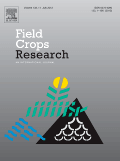
FIELD CROPS RESEARCH
Pioneering Discoveries in Agronomy and Soil ScienceFIELD CROPS RESEARCH is a premier academic journal published by Elsevier, dedicated to advancing knowledge in the fields of Agronomy and Crop Science as well as Soil Science. Now in its 46th year of publication, this esteemed journal has established itself as a leading resource, holding a prestigious Q1 ranking in both the Agronomy and Soil Science categories, with a remarkable blend of rigorous peer-reviewed research and innovative findings. With a Scopus ranking of #27/406 in Agronomy and #20/159 in Soil Science, and a notable 93rd and 87th percentile respectively, FIELD CROPS RESEARCH plays a vital role in informing practices that drive sustainable agriculture and optimize crop production. Although not an open access journal, it remains highly accessible to the global research community and offers critical insights that influence policy and agricultural practices worldwide. Researchers, professionals, and students are encouraged to delve into this journal, as it continues to shape the future of field crop research through impactful studies and comprehensive reviews.

Rhizosphere
Advancing Knowledge at the Intersection of Soil and PlantsRhizosphere is a prestigious journal published by Elsevier that focuses on the integrative study of the soil-root interface and its immense implications in agronomy, crop science, and soil science. With an impressive track record since its inception in 2016, this journal stands out as a key resource in the field, achieving a Q1 ranking in three critical categories: Agronomy and Crop Science, Plant Science, and Soil Science as of 2023. The journal's impact is underscored by its ranks in Scopus, where it places within the top tiers of its fields—#72/406 in Agronomy and Crop Science, #92/516 in Plant Science, and #38/159 in Soil Science. Rigorous peer review and a commitment to open discourse make Rhizosphere an essential platform for researchers, professionals, and students who seek to advance their understanding of plant interactions with soil ecosystems. With accessible content options, the journal contributes significantly to advancing knowledge and innovation within the global scientific community.
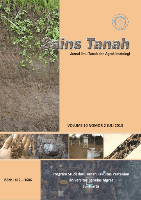
SAINS TANAH
Cultivating Knowledge for a Sustainable FutureSAINS TANAH is a renowned peer-reviewed journal that focuses on the fields of agronomy, soil science, and environmental studies, published by Universitas Sebelas Maret Surakarta in Indonesia. Established as an Open Access platform since 2001, it aims to disseminate high-quality research that addresses critical issues in soil health, crop management, and pollution, thereby fostering sustainable agricultural practices. With its current impact factor demonstrating a Category Quartile ranking of Q3 and Q4 in major areas such as Agronomy and Crop Science, Atmospheric Science, and Pollution, SAINS TANAH serves as an essential resource for researchers, professionals, and students dedicated to advancing knowledge and solutions in these vital fields. By providing a collaborative environment and upholding rigorous academic standards, the journal not only highlights the significance of Indonesian research contributions but also aims to connect local insights with global agricultural and environmental challenges.

Journal of Soil Science and Plant Nutrition
Innovating research for a greener, healthier planet.The Journal of Soil Science and Plant Nutrition, published by SPRINGER INT PUBL AG, is a premier academic journal dedicated to advancing the fields of agronomy, plant science, and soil science. With an impressive Q1 ranking in both Agronomy and Crop Science and Plant Science, alongside a Q2 ranking in Soil Science, this journal stands at the forefront of innovative research and knowledge dissemination. Annually indexed in key databases, it provides a platform for high-quality research articles that explore the complex interactions between soil health and plant nutrition, contributing significantly to sustainable agricultural practices. Although it does not offer open access options, the journal is accessible through various academic institutions and libraries, ensuring a wide readership. With its emphasis on impactful findings, the journal is an essential resource for researchers, professionals, and students aiming to further their understanding and application of soil and plant science in an ever-evolving global context.

Agrisost
Connecting researchers to revolutionize agricultural sciences.Agrisost is a prominent, peer-reviewed Open Access journal dedicated to advancing research in the fields of agriculture and sustainable development. Published by the University of Camagüey Ignacio Agramonte Loynaz in Cuba, this journal has been providing researchers and professionals with a platform to disseminate their findings since 2011. With its unique focus on the challenges and innovations in agricultural practices, Agrisost aims to bridge the gap between theory and application, fostering a collaborative environment for scientists, practitioners, and students alike. The journal’s commitment to open access ensures that a diverse audience can access high-quality research without barriers, making it an invaluable resource for anyone engaged in agricultural sciences. Researchers and students are encouraged to contribute their insights and findings to help shape the future of sustainable agriculture and food security.

Chemical and Biological Technologies in Agriculture
Pioneering Research for Sustainable AgricultureChemical and Biological Technologies in Agriculture is a premier open-access journal published by SPRINGER, dedicated to advancing research in the fields of agronomy, crop science, biochemistry, biotechnology, and food science. Established in 2014, this journal has quickly gained recognition, boasting impressive rankings with Q1 status in Agronomy, Crop Science, Biotechnology, and Food Science categories as of 2023, underscoring its significance in fueling innovations in agricultural technology. With an E-ISSN of 2196-5641, it provides a platform for researchers and practitioners to disseminate impactful findings and methodologies that address key challenges in sustainable agricultural practices. By facilitating open access to contemporary research, the journal aims to foster collaboration and knowledge exchange among multidisciplinary stakeholders in the agricultural sector. With a commitment to excellence reflected in its Scopus rankings, notably #57 in Agronomy and Crop Science, it serves as an invaluable resource for professionals, researchers, and students striving for breakthroughs in chemical and biological technologies. The journal remains at the forefront of addressing global food security and environmental sustainability through rigorous scientific inquiry.
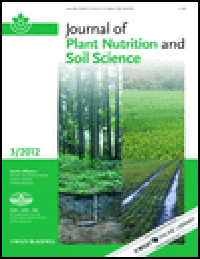
JOURNAL OF PLANT NUTRITION AND SOIL SCIENCE
Empowering researchers to cultivate excellence in agriculture.JOURNAL OF PLANT NUTRITION AND SOIL SCIENCE, published by WILEY-V C H VERLAG GMBH, stands as a premier platform in the field of agricultural and biological sciences, focusing specifically on the intricacies of plant nutrition and soil science. With an impressive impact factor and a respected Q1 category ranking in Plant Science and Q2 category ranking in Soil Science for 2023, this journal is essential for researchers and professionals seeking to advance their understanding and foster innovative practices in sustainable agriculture. The journal’s open access options ensure a broad dissemination of knowledge, appealing to a global audience and facilitating collaborative research efforts. Embracing a broad scope that extends from foundational science to cutting-edge research developments in soil health and nutrient management, the journal serves as a critical resource for both emerging scholars and established experts, reinforcing its pivotal role in addressing the challenges of food security and environmental sustainability. With years of convergence from 1996 to 2024, it remains committed to excellence in scholarly communication, providing a vital forum for the sharing of valuable insights and advancements in the field.
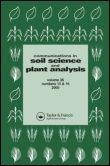
COMMUNICATIONS IN SOIL SCIENCE AND PLANT ANALYSIS
Connecting Science and Sustainability in Soil and Plant AnalysisCOMMUNICATIONS IN SOIL SCIENCE AND PLANT ANALYSIS, published by Taylor & Francis Inc, is a prestigious journal dedicated to advancing research in the fields of agronomy, crop science, and soil science. Established in 1970, the journal has maintained a significant presence over the years, with a commitment to publishing high-quality, peer-reviewed articles that contribute to the understanding of soil and plant interactions. With an impressive Q2 ranking in both Agronomy and Soil Science, it positions itself as a vital resource for researchers, professionals, and students alike, keen on exploring innovative solutions to contemporary agricultural challenges. Although it currently does not provide open access, the journal ensures wide dissemination through its established subscription services. The journal's focus on empirical research, methodologies, and technological advancements in soil management and plant nutrition makes it an essential platform for disseminating knowledge and fostering discussions within the scientific community. Located in the heart of Philadelphia, USA, it remains a significant contributor to the global dialogue on sustainable agriculture and environmental stewardship.
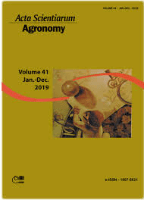
ACTA SCIENTIARUM-AGRONOMY
Shaping the future of agronomy with impactful research.ACTA SCIENTIARUM-AGRONOMY is a prestigious, peer-reviewed journal published by UNIV ESTADUAL MARINGA, PRO-REITORIA PESQUISA POS-GRADUACAO, focusing on advanced research in the field of agronomy and crop science. Since its inception as an Open Access journal in 2007, it has significantly contributed to disseminating high-quality research, allowing unrestricted access to its content for a global audience. Operating from Brazil, the journal holds a notable Q2 category ranking in Agronomy and Crop Science as of 2023, validating its importance within the academic community. The journal’s Scopus ranking positions it in the 49th percentile among Agricultural and Biological Sciences, indicating a robust foundation for impactful research. With a commitment to innovation and scientific excellence, ACTA SCIENTIARUM-AGRONOMY aims to provide researchers, professionals, and students with vital insights that drive forward our understanding of agriculture and its environmental implications.